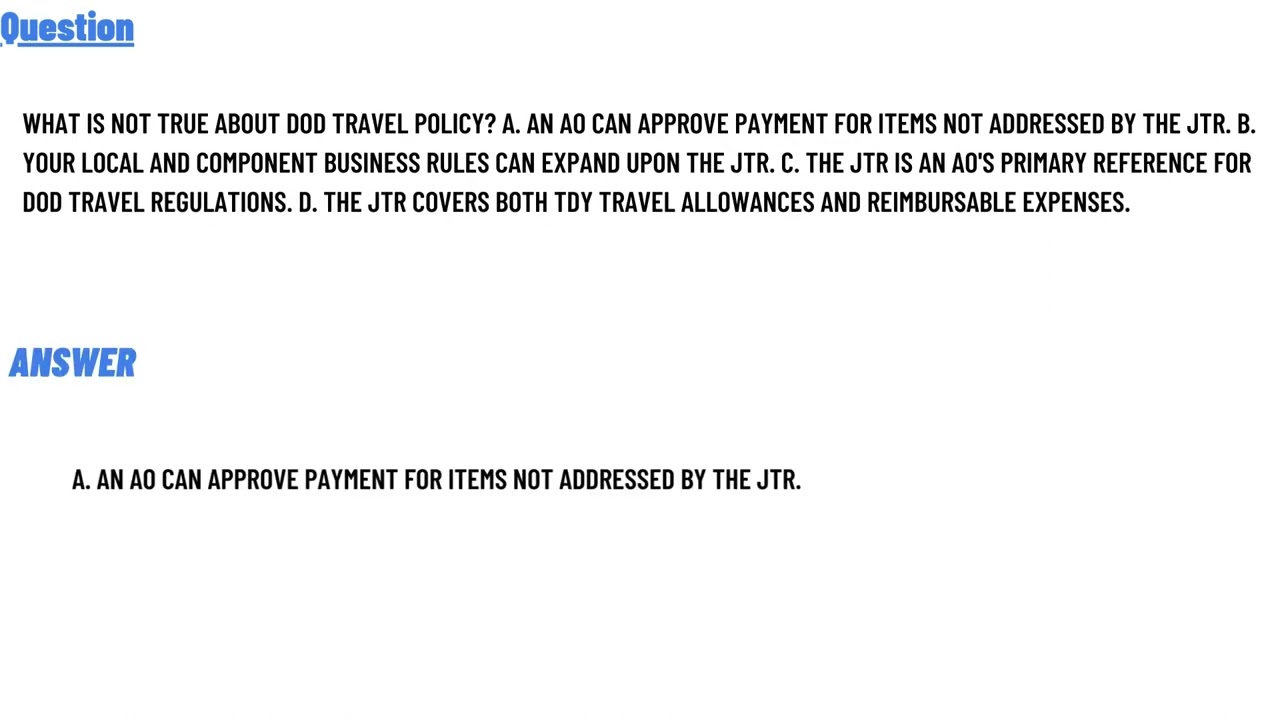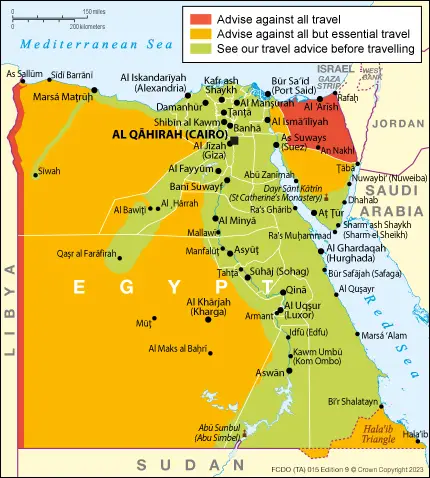What is not true about DoD travel policy is that it allows unlimited personal expenses. The policy has strict guidelines for reimbursement.
The Department of Defense (DoD) travel policy ensures that military and civilian personnel adhere to specific rules during official travel. This policy aims to regulate travel expenses, ensuring they are necessary and reasonable. Authorized travelers must follow guidelines on lodging, meals, and transportation.
The DoD policy prohibits certain personal expenses and ensures compliance with government regulations. Understanding this policy helps avoid financial discrepancies and ensures proper use of taxpayer money. Adhering to these guidelines is crucial for maintaining accountability and transparency in government-funded travel.
Introduction To Dod Travel Policy Myths
Many people have misconceptions about the Department of Defense (DoD) travel policy. These myths can lead to confusion and mistakes. Understanding the true policies is essential for smooth travel experiences.
Common Misconceptions
There are several myths about DoD travel policy. Let’s debunk some of these common misconceptions:
- Myth: All DoD travel is fully funded. This is not true. Some travel costs might need to be covered by the traveler.
- Myth: You can choose any airline. The policy requires using specific airlines under certain agreements.
- Myth: Per diem rates are the same everywhere. These rates vary by location.
Importance Of Accurate Information
Having accurate information about DoD travel policy is crucial. It helps avoid mistakes and ensures a smooth travel process.
Incorrect information can lead to:
- Delays in travel approvals
- Out-of-pocket expenses
- Compliance issues
Make sure to verify the facts before planning any DoD travel. This will save time and prevent unnecessary hassles.
Myth 1: Unlimited Travel Budget
Many believe that the Department of Defense (DoD) has an unlimited travel budget. This is far from the truth. Understanding this myth helps in managing expectations and planning better.
Reality Of Budget Constraints
The DoD operates within strict budget constraints. Each travel request is scrutinized to ensure it aligns with budget allocations. Travel budgets are not unlimited. They are carefully managed to avoid overspending.
| Aspect | Reality |
|---|---|
| Travel Requests | Reviewed for necessity |
| Budget Allocation | Strictly defined |
| Spending | Closely monitored |
Managing Expectations
Employees must understand the limits of the travel budget. Not every request will be approved. Priority is given to essential missions and activities.
- Prioritize essential travel
- Understand budget constraints
- Plan and request early
By managing expectations, employees can plan better and align their travel needs with available resources. Clear communication about budget limitations helps avoid misunderstandings.
Myth 2: Personal Travel Is Fully Covered
Many believe that the Department of Defense (DoD) covers all travel expenses. This myth is not true. Personal travel expenses are not fully covered by the DoD. Understanding the policy is crucial for service members.
Clarifying Official Travel
Official travel refers to trips taken for work. The DoD covers these expenses. This includes transportation, lodging, and meals. Personal travel does not fall under this category.
Personal Vs. Professional Expenses
Personal expenses are costs incurred during leisure travel. The DoD does not cover these. Here is a table to clarify:
| Type of Expense | Covered by DoD |
|---|---|
| Flight for work | Yes |
| Hotel for work | Yes |
| Meals for work | Yes |
| Leisure trip flight | No |
| Leisure trip hotel | No |
| Meals during leisure trip | No |
Service members must distinguish between personal and professional travel. Only professional travel expenses are reimbursed. Always check the travel policy before planning a trip.
Myth 3: Luxury Accommodations Are Standard
Many people think the Department of Defense (DoD) travel policy includes luxury stays. This is not true. The DoD aims to spend taxpayer money wisely. This means they avoid unnecessary expenses.
Accommodation Guidelines
The DoD has clear rules for lodging. Service members and employees must follow these rules. They cannot choose luxury hotels without good reason.
The Per Diem, Travel, and Transportation Allowance Committee (PDTATAC) sets these rules. They decide the daily allowance for trips. This allowance covers lodging, meals, and other expenses.
Staying within the budget is important. The rules ensure that all travelers use taxpayer money responsibly. They must choose options that are cost-effective and reasonable.
Permissible Lodging Options
Permissible lodging options include many types of accommodations. These options must fit within the set budget. Below is a table of common lodging types and their guidelines:
| Lodging Type | Guidelines |
|---|---|
| Military Lodging | First choice for service members. Usually very cost-effective. |
| Government-Contracted Hotels | Special rates are available. Must be within the allowable per diem rate. |
| Commercial Hotels | Used when other options are not available. Must still fit within the budget. |
Luxury hotels are rarely permissible. They are only used in special cases. This includes when no other options are available.
Travelers must always check the per diem rates before booking. This ensures they stay within the allowed budget. Failing to do so may result in personal expenses.
Understanding these guidelines helps avoid mistakes. It ensures that all travel expenses are justified and reasonable.
The DoD travel policy focuses on practicality. It ensures that service members and employees use resources wisely.
Myth 4: Approval Process Is Arbitrary
Many believe the Department of Defense (DoD) travel approval process is arbitrary. This misconception stems from a lack of understanding. The truth is, the process is well-structured and based on specific criteria.
Understanding The Approval Hierarchy
The DoD has a clear approval hierarchy for travel requests. Each level of the hierarchy has specific roles and responsibilities.
- Unit Commander: First level of approval.
- Travel Coordinator: Reviews and forwards requests.
- Financial Officer: Ensures budget compliance.
- Senior Command: Final approval for high-level travel.
Criteria For Travel Authorization
Travel authorization is granted based on clear criteria. These criteria ensure each travel request is necessary and justified.
- Mission Relevance: Travel must support mission objectives.
- Cost-Effectiveness: Travel must be the most economical option.
- Security Clearance: Traveler must have required security clearance.
- Health and Safety: Travel must not pose health risks.
By understanding the approval hierarchy and criteria, it becomes clear that the DoD travel process is not arbitrary. Each step and requirement ensures that travel is justified, safe, and cost-effective.

Credit: bareknucklepolitics.com
Myth 5: Travel Policy Is The Same For All Branches
Many believe that the Department of Defense (DoD) travel policy is uniform across all military branches. This is a common misconception. Each branch of the military has its own specific guidelines. Understanding these differences is crucial for service members.
Branch-specific Regulations
The Army, Navy, Air Force, and Marine Corps each have unique travel policies. These policies cater to the specific needs and missions of each branch. For example, the Army might have different allowances for deployments compared to the Navy.
Let’s take a closer look:
| Branch | Special Provisions |
|---|---|
| Army | Higher allowances for ground transport |
| Navy | Additional provisions for sea travel |
| Air Force | Specific rules for air transport |
| Marine Corps | Special allowances for rapid deployments |
Joint Travel Regulations
The DoD also has Joint Travel Regulations (JTR). These regulations apply to all service members, regardless of branch. The JTR provides a baseline for travel entitlements and allowances. But, each branch can add its own rules on top of the JTR.
For instance, the JTR might set a standard rate for per diem. Yet, the Army could allow a higher rate for specific missions. This flexibility ensures that each branch meets its unique operational needs.
Here are some key points:
- JTR offers a standard framework for all branches.
- Each branch can modify rules to suit its needs.
- Service members should always check both JTR and branch-specific policies.
Understanding these differences can help service members plan their travels better. It ensures they are aware of their entitlements and allowances. Misunderstandings can lead to financial issues and unnecessary stress.
Myth 6: No Restrictions On Destination
Many believe there are no limits on where you can travel under DoD travel policy. This myth is far from the truth. The Department of Defense has strict rules on travel destinations. Understanding these rules is crucial for all personnel.
Travel Advisories And Restrictions
The DoD issues travel advisories based on the safety and security of destinations. These advisories are updated regularly to reflect current conditions. They help protect military personnel from potential threats.
Travel advisories are classified into different levels. Each level indicates the degree of caution required. Ignoring these advisories can lead to severe consequences.
Level 1: Exercise normal precautions.
Level 2: Exercise increased caution.
Level 3: Reconsider travel.
Level 4: Do not travel.
These levels guide personnel on safe travel practices. They ensure readiness and safety at all times.
High-risk Destinations
Some destinations are deemed high-risk due to various factors. These factors include political instability, terrorism, and health risks.
The DoD maintains a list of high-risk destinations. This list is updated regularly to reflect current conditions. Travel to these areas is heavily restricted or prohibited.
Personnel must seek approval before traveling to high-risk areas. This approval process ensures all safety protocols are in place.
High-risk destinations require additional security measures. These measures may include:
- Special briefings
- Extra security personnel
- Strict travel itineraries
These steps ensure the safety of all military personnel. Ignoring these restrictions can put lives at risk.
In summary, there are significant restrictions on travel destinations under DoD policy. Staying informed about travel advisories and high-risk destinations is essential for all personnel.

Credit: travelradio.live
Myth 7: Dod Travel Is Always First Class
Many people believe that Department of Defense (DoD) travel is always first class. This myth is not true. The DoD has specific rules and guidelines for travel.
Travel Class Entitlements
The DoD has strict travel class entitlements. Most service members travel in economy class. This includes flights, trains, and other forms of transportation.
Travel class entitlements depend on the rank and the length of the trip. Higher-ranking officials may get business class for long flights. But first class is rare, even for them.
Cost-saving Measures
The DoD follows cost-saving measures to manage travel expenses. These measures help save taxpayer money. Service members are required to choose the most cost-effective travel option.
The DoD uses a travel system to find the best prices. This system helps to book flights, hotels, and rental cars at the lowest rates possible.
| Rank | Travel Class | Duration |
|---|---|---|
| Junior Enlisted | Economy | Any Duration |
| Senior Officers | Business (Long Flights) | Over 14 Hours |
| General Officers | Business | Over 14 Hours |
These rules ensure fairness and cost-efficiency. Misconceptions about first-class travel are common but incorrect.
Understanding these travel policies helps clear up myths. The DoD works hard to keep travel costs low while meeting mission needs.
Myth 8: Family Members Can Always Accompany
Many people believe that family members can always join military personnel on their travel. This is a common misunderstanding. Military travel policies have specific rules about who can travel and when.
Dependent Travel Policies
Dependent travel policies are crucial for military families. Not every trip allows family members to join. There are strict guidelines about this.
| Travel Type | Family Member Eligibility |
|---|---|
| Temporary Duty (TDY) | Family members usually cannot join. |
| Permanent Change of Station (PCS) | Family members can join, but there are conditions. |
| Deployment | Family members cannot join. |
For Temporary Duty (TDY) assignments, family members generally cannot accompany the service member. This is because these trips are short and focused on specific tasks.
During a Permanent Change of Station (PCS), family members can join the service member. But, certain conditions must be met. The new location must have adequate housing and facilities.
During deployments, family members are not allowed to travel with the service member. This is for safety and operational reasons.
Exceptions And Special Cases
There are exceptions and special cases where family members might be allowed to join. These are rare and usually need special approval.
- Emergency situations
- Medical reasons
- Special duty assignments
In emergency situations, such as a serious illness or death in the family, family members might be allowed to join. This requires special approval from higher authorities.
For medical reasons, if a family member needs special care, they may be allowed to travel. This also requires approval and documentation.
Special duty assignments may allow family members to join. These assignments are unique and not common. Approval is needed for these cases too.
Navigating The Real Dod Travel Policy
Understanding the DoD travel policy can be confusing. There are many myths and misconceptions. Knowing the real rules helps avoid mistakes. This guide helps you find the truth about the DoD travel policy.
Finding Reliable Resources
To find reliable information, use trusted sources. The official DoD website is a good start. It has up-to-date travel policies and guidelines. Another great source is the Defense Travel Management Office (DTMO). DTMO provides detailed travel regulations and FAQs.
Books and manuals from DoD are also helpful. Look for the Joint Travel Regulations (JTR). It covers all travel rules for DoD personnel. Many people find answers to their questions in the JTR.
Ask your travel office for help. They can guide you to the correct information. They also know the latest updates and changes.<h3Staying Updated on Policy Changes
DoD travel policies change often. Stay updated to avoid issues. Regularly check the DoD and DTMO websites for updates. They announce changes and new rules there.
Sign up for email alerts from DTMO. They send updates and important news. This helps you stay informed without checking the website daily.
Your travel office can also notify you of changes. They get updates directly from DoD. Make sure your contact information is current with them.
Table Of Key Resources
| Resource | Description | Link |
|---|---|---|
| DoD Website | Official site for DoD travel policies | Defense.gov |
| DTMO | Defense Travel Management Office | DTMO |
| Joint Travel Regulations | Comprehensive travel rules for DoD personnel | JTR |
By using these reliable resources and staying updated, you can navigate the real DoD travel policy with confidence. This helps you avoid common mistakes and follow the correct rules.
“`

Credit: www.stuvia.com
Conclusion
Understanding the misconceptions about DoD travel policy ensures smoother and compliant travel experiences. Staying informed helps avoid common pitfalls. Always verify information through official sources. By doing so, you ensure accurate knowledge and adherence to the rules. Safe and efficient travel is within reach with the right information.


















